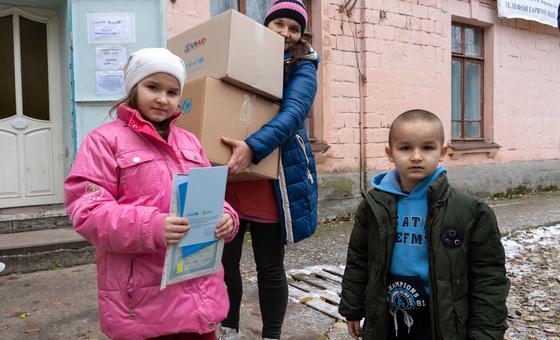That’s according to UN Children’s Fund (UNICEF) Regional Director Regina De Dominicis who said in a statement on Monday that bombardment was “particularly unrelenting” in the east and south of the country.
The UNICEF official said the past week provided a concerning trend with an increase in ballistic missiles and mass drone attacks, including widespread targeted attacks on Kyiv’s infrastructure.
“These attacks have caused injuries among children, sent an intensified wave of fear and dread through already deeply distressed communities, and left millions of children across Ukraine without sustained access to electricity, heating and water, exposing them to additional serious harm as temperatures plummet”, she said.
“Children and families most at risk are those who already have the least access to basic, life-depending resources to start with, and who have already endured immense hardship”, she added. “These children and their families have nothing to fall back on.”
Winter temperatures regularly go as low as -20°C.
“Children simply cannot withstand these conditions without energy”, she warned.
Blackouts
“Blackouts and power cuts make it extremely challenging for health facilities to provide critical services, another dire situation given the rise in cases of pneumonia, seasonal influenza and waterborne diseases among children across Ukraine.”
Around 1,800 children have been killed or injured since the escalation of the war in Ukraine in February 2022.
“UNICEF is providing generators and other equipment to support the Government of Ukraine in keeping water supply, heating, health and education facilities running”, said Ms. De Dominicis. “In the hardest hit areas, UNICEF is providing winter clothing sets for children along with blankets for their families. We are also reaching families with cash assistance.”
Russia: Rights expert slams Navalny’s ‘enforced disappearance’
Jailed Russian opposition figure Alexey Navalny should be immediately released and “provided remedies and reparations for all the harm suffered” in accordance with international law, a UN-appointed independent rights expert said on Monday.
Mr. Navalny’s whereabouts have been unknown for over 10 days, which according to Mariana Katzarova, the UN Special Rapporteur on the situation of human rights in Russia, amounts to enforced disappearance.
“I am greatly concerned that the Russian authorities will not disclose Mr. Navalny’s whereabouts and wellbeing for such a prolonged period of time,” she said.
A Friday court hearing on the violations of Mr. Navalny’s human rights in detention did not take place and Mr. Navalny’s lawyers were reportedly told by the court that their client is no longer held in the Vladimir region.
Ms. Katzarova cited concerns about Mr. Navalny’s “persistent” ill-treatment in detention and lack of access to adequate medical care since January 2021.
On 4 August 2023 he was sentenced to an additional 19 years on “extremism” charges, a term which, according to the independent expert, “has no basis in international law”.
Following sentencing Mr. Navalny was being prepared to be transferred to a harsher regime penal colony. Three of his lawyers were arrested in October.
Human Rights Council-appointed independent experts, including Special Rapporteurs, serve in their individual capacity and receive no salary for their work, nor are they UN staff members.
Nuclear disarmament youth leader programme gets underway
The 100 young people selected to serve on the UN Office for Disarmament Affairs’ Youth Leader Fund for a World without Nuclear Weapons, met together for the first time on Monday.
Representing over 60 countries and selected from over 2,000 applicants from around the world, “they will spend the next year learning about nuclear disarmament and developing their skills to become changemakers for a world without nuclear weapons – the most destructive weapons on earth”, said the UN disarmament affairs office (UNODA) in a news release.
As part of this innovative training programme, made possible by the generous support of Japan and implemented by UNODA – with support from the United Nations Institute for Training and Research – they will take part in interactive online learning, engagement with experts from the field and an immersive study tour to Japan, including participation in a youth-led conference.
As the programme kicked off on Monday, the future changemakers heard from the Prime Minister of Japan Mr. Fumio Kishida, and UN Secretary-General António Guterres.
Prime Minister Kishida, a native of Hiroshima, has been a strong advocate for keeping alive the lessons of the atomic bombing of Hiroshima and Nagasaki – which wrought tremendous death, suffering and devastation.
“No matter how difficult the path to a world without nuclear weapons may be, we should not stop our steps. Now is the time when we need the power of young people like you, the bearers of our future”, he told the group.
Safeguarding ‘our common future’
In his message, Mr. Guterres encouraged the participants to tap into their energy, innovative ideas, and creativity to help usher in a new era of a world free of nuclear weapons.
“In the name of our common future – in the name of humanity – let us spare no effort to rid the world of nuclear weapons, once and for all”, he said.
In recent years, the Secretary-General has made a major push to empower youth, recognizing their role as the ultimate force for change and noting they have become a strong and powerful force in support of disarmament.

